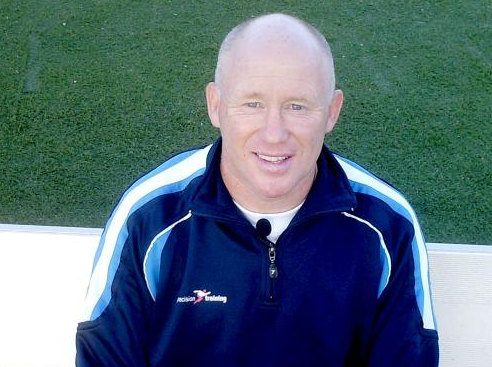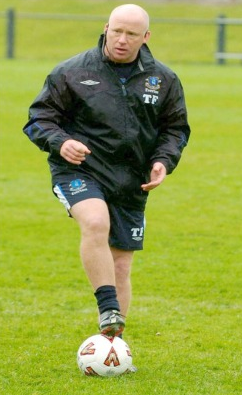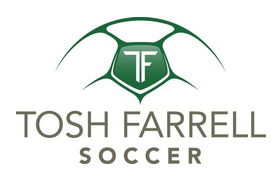Developing Youth Soccer Players Together
Tony “Tosh” Farrell Partners with one.Soccer Schools
Tosh Farrell and one.Soccer Schools Team Up To Develop Youth Soccer Players – Tony “Tosh” Farrell, the former Head of International Football Development @ EPL’s Everton FC was responsible for helping to develop Manchester United star Wayne Rooney among others. Guess what he has to say about youth soccer in America? And on player development?
 In the world of soccer, or football as most of the world knows it, names of the great players come easily to anyone with even a minor knowledge of the game. What are not as well known are the names of those coaches who have helped those internationally-acclaimed athletes reach the peak of their game. However, there are a few individuals who are internationally-regarded for their ability to get the most out of an athlete and steer him or her to the top of the game.
In the world of soccer, or football as most of the world knows it, names of the great players come easily to anyone with even a minor knowledge of the game. What are not as well known are the names of those coaches who have helped those internationally-acclaimed athletes reach the peak of their game. However, there are a few individuals who are internationally-regarded for their ability to get the most out of an athlete and steer him or her to the top of the game.
One of these is Tony “Tosh” Farrell, the former Head of International Football Development and Technical Coordinator at the English Premier League (EPL) club Everton FC. Now the head of Tosh Farrell Soccer Academies in Amesbury, Mass., just outside of Boston, Farrell has been called one of the world’s leading youth coaches. At Everton, he was responsible for helping to develop Manchester United star Wayne Rooney, James Vaughan, who at age 16 became the youngest goal scorer in the EPL, and several members of Everton’s first team.
Farrell recalls that Rooney was a talented player even at a young age, although, as he admits, “You don’t know it is Wayne Rooney – as a coach coaching a young player, you just know he is a talented player.”
“Many a child prodigy falls by the wayside,” says Farrell, but not Rooney. “As he got older it became obvious that he was focused, and by the time he was 14 or 15, people became aware of his talents. When Wayne would cross that white line on the soccer field, he would turn into a soccer animal. It was black and white with him. He was a very relaxed, calm person on one side of the line and a completely focused animal on the other.”
During his 13 years at Everton, Farrell focused on creating his Soccer Development Methodology to help other players reach their potential on the pitch. He has since gone on to expand that to his current mission of helping both coaches and players “maximize their own potential.” The program Farrell produced, the “Everton Way,” was the first training program readily available on the Internet. In Massachusetts, his Tosh Farrell Soccer Club provides youth players with a program built on a “holistic ages and stages curriculum” that focuses on every aspect of technique and game understanding as well as diet and nutrition.
Farrell, who holds the UEFA ‘A’ License and English FA Coach Educator Level 1 and 2 Licenses among others, has been recognized for his work with youth players by many top individuals in world coaching. Simon Clifford, who founded Brazilian Futebol de Salão schools in England, has said that Farrell is “light years ahead of anyone else.” Former Irish FA Chief Executive Howard Wells has likewise called him “one of the most inspirational coaches of young players I have seen.” Former Manchester United sports psychologist Bill Beswick has said Farrell’s focus “is exclusively on the process of development – he knows if he gets this right the score will take care of itself.”

Since coming to the United States, Farrell has had the opportunity to observe the American youth soccer scene, and what he sees concerns him. “The youth soccer scene has evolved greatly in the past few years, but I can say that the Game ratio in the USA out of balance,” Farrell says. “We need to practice more and play less. If you gave a typical youth soccer player the choice of going to practice or to a game, the player would go for the game but the practice is what is so important.”
Farrell points out that kids instinctively practice soccer, kicking rocks, cans and other items along the way as they walk. While regular practice is what helps train players, the average player will only have about two minutes on the ball during a match. According to Farrell, the American focus on games is a detriment to long-term development.
“The emphasis on the game is creating stereotypes,” Farrell insists. “We are not developing players the way we should. American clubs are training limited techniques, which give you limited options on the field; you put twenty players on the field and they all look the same.”
One aspect of American soccer that puzzles and disappoints Farrell the most is the tryout system that many clubs use.
“Part of my world was scouting and recruiting for Everton – you would look at a player and ask if they had the potential to be in the program for a sustained period of time and where they could go,” Farrell explains. “Here people have tryouts and they swap out a player who they think is better than the one they have got. You recruit them, and now you have ended up with eye catchers – but now you have to put them around in certain positions. We recruited players first and positions second.”
“Why have a development program at all if you are going to replace your players every year with tryouts?” Farrell asks. “There is a lack of emphasis on investing in players – really developing players, which takes time.”
To develop a program that truly helped prepare young players to move ahead in the game, Farrell says he put himself in the mindset of a seven-year-old player. “What do they want?” he asked himself. “They want to be Ronaldo, Messi – they want to score goals, not be defenders.”
Farrell’s answer was to develop a program where young players had no fear of failure. Beginning with 2v2 situations, he slowly brought them up to where they wanted to be and then helped them grow further from there. Players were encouraged to use their imagination and were not made to conform to some “ideal.” The overall goal was to develop players for the long run.
Recently Farrell and Tosh Farrell Soccer Academies have partnered with one.Soccer Schools based in Santa Barbara, Calif. Founders Lloyd Biggs and Jeff Johnson are excited to work with Farrell, a man they both highly admire, to provide exclusive training to young players in Massachusetts. Beginning July 7, one.Soccer Schools and Tosh Farrell Soccer Academies will offer four week-long half-day and full-day camps for youth players ages 6-16 at Amesbury Sports Park. The camps will run July 7-11 and 14-18 and August 4-8 and 11-15.
Explaining why he decided to partner with Biggs and Johnson, Farrell says, “It is real simple, we both have the same philosophy, we both believe in developing players before positions – we believe in developing players for their future.”
The half-day Junior Camps for ages 6-9 will run from 9:00 a.m. to noon, with a focus on the basic skills of dribbling, passing and receiving, as well as 1v1 techniques and “going to goal.” Each day will conclude with short 4v4 matches and a debriefing and the week will end with a 5v5 tournament and closing ceremony.
The full-day Premier Camps for ages 10-16 run from 8:00 a.m. until 4:00 p.m. on Monday through Thursday, with a half day on Friday. These camps will open with one.Soccer Schools’ unique “Soccersize” exercise sessions, followed by soccer-specific physical training, Going 4 Goal and dribbling drills. Following lunch, players will work with technique and tactics drills and close with soccer-specific goals and Footvolley. The week will conclude with Footvolley and 5v5 tournaments and a closing ceremony.
Visit Tosh Farrell Soccer for more information about programs, or one.Soccer Schools to register for the Amesbury, MA, training weeks.







